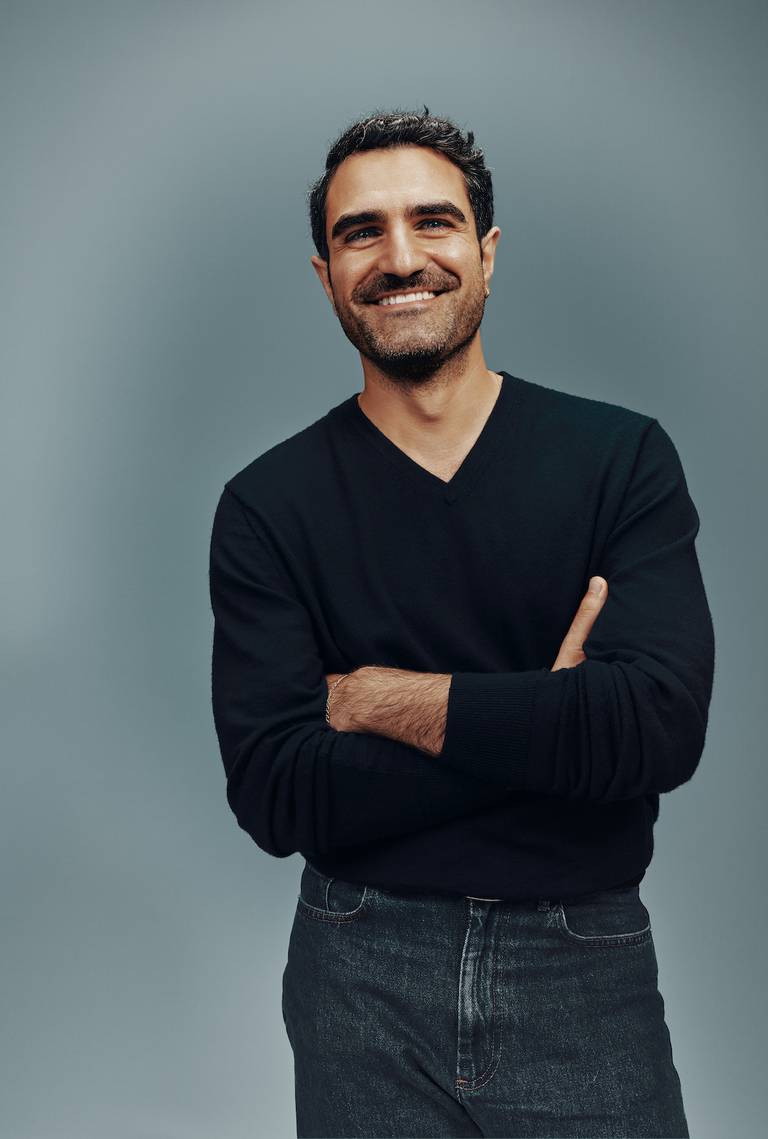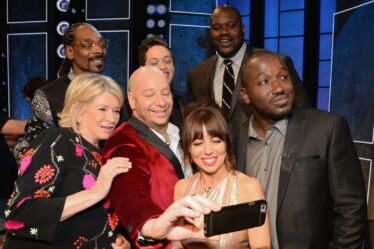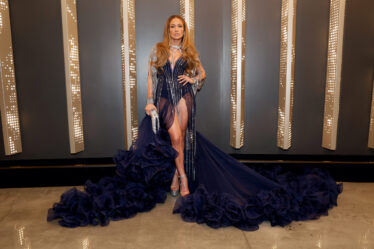
Discover global job opportunities in creative roles on BoF Careers today. Watch the full interview, Building a Career in Fashion with Adam Baidawi, on-demand on LinkedIn.
Growing up in Melbourne, Australia, Adam Baidawi developed a passion for print and media, in particular GQ, from a young age. “I spent the ages of 18 to 28 obsessed with GQ,” he told BoF. “I could pick up a copy of British GQ and know within a few sentences of reading the cover story [who] had written it.”
While studying communications at RMIT University in Melbourne, Baidawi began building up a portfolio of work, producing music reviews for a street press music magazine and collecting bylines as a freelance writer and photographer. “I said yes to everything that came out on offer, knowing full well that part of my way of getting in might be being the person who was easy to work with.”
He would eventually pull together enough money to fly to the UK for a work placement at British GQ and later Esquire, before returning to Australia and working freelance for Australian GQ and The New York Times, among other publications..
When Condé Nast decided to launch a GQ Middle East edition, Baidawi — who has Iraqi heritage — applied immediately. After some months, he was eventually appointed as the first editor-in-chief at GQ Middle East, and moved to Dubai to run the publication. In 2020, Baidawi was promoted to deputy global editorial director, supporting GQ’s 21 editions around the world, and relocated to London to head up editorial content at British GQ. His work has also appeared in Vanity Fair, Vogue, CNN and Rolling Stone.
Now, BoF shares key insights and advice from his interview on the BoF Careers series, Building a Career in Fashion.
How did you land your first job?
In my early twenties, I wanted to land an American GQ cover or feature story or do a huge profile there. But I was fully cognisant that if someone didn’t have experience in writing and publishing work for other big, prestigious American publications […] it would kind of be a non-starter for a GQ editor to take a look at someone with little to no experience.
So I worked backwards from there. I realised that I could either worm my way into a prestigious American publication, which could take years, or acknowledge that there are dozens of editions of GQ round the world, including in Australia, where I was. So I said — my short term target is Australian GQ. […] And then I worked backwards from there again.
I looked up a bunch of freelance contributors to Australian GQ, I got to understand what kind of experience they’d had in their career, what other publications they’d written for, and worked all the way backwards, until I pitched to [Beat], a street press music magazine in my home city of Melbourne. I opened it up, found the editor’s email address and [asked him to give me a shot]..
From there, […] I pitched Australian GQ for two consecutive years. And I applied that same lens of obsessiveness to everything I did. So I knew their entire roster of writers inside out, I knew rumblings within the industry [and that Australian GQ were] hiring a really wonderful editor called Kerry David. And I didn’t pitch her on her first day, but I did pitch her on her second day and she was the first person that accepted one of my GQ pitches. I was incredibly precise, I did my research and I was systematic about getting to where I wanted to [go].
How did you develop your skill sets when starting out?
I was not a particularly good writer, but through repetition and saying yes to so many different types of subjects — I interviewed Shaggy and Maroon 5 and Leo Sayer and every kind of musician you could imagine — [I was able to improve]. It was like building muscle. I grew to become pretty decent at interview technique, pretty decent at researching, a faster transcriber, pretty good with headlines or kickers or the way you open up a section.
Enthusiasm and the way you apply it when you’re just starting out is so important. Things like deep-dive research and taking the time to really understand a publication or a brand inside out, or as well as someone who might work there — it’s free. It costs you time, but it makes such a different impression approaching someone or a brand or a publication [when you know them] inside out. Specificity goes a long way.
Pitching itself — you could say it’s a soft skill or you could say it’s a hard skill. But learning how to write a really succinct, persuasive, useful email to someone who doesn’t necessarily need anything from you, is a really great skill to hone in on. And the only way to get better at it is by doing it repeatedly.
What is your advice for reaching out to industry professionals?
I personally don’t think the medium of communication matters that much — journalists and editors are inundated on social media, they’re inundated in their inbox. There is no good place. […] I would keep [your message] incredibly short. Can you get your message or request across in four sentences? Can you reveal the work you’ve already put in? Maybe target a [mid-level employee] whose feature you found engaging rather than the most senior person.
In that four-sentence note that you prepare for them, make sure you give a really specific note about a piece of their work that you’ve seen and appreciated. You might ask them for a coffee, you might say that you’re really interested in doing some work experience [at their publication]. Target different people at different levels within an organisation to give yourself a shot. I did that kind of thing all the time.
The vast majority of the time, you might hear nothing. Don’t be discouraged, this is a numbers game. It’s an intention-based game. Cut through.
What do you believe is most effective when building a network?
Part of it comes down to sincerity. It’s a little bit like friendship. If you rock up once a year and ask a friend for a favour they’ll be like — what? The people that you want to have closest to you and the people that will be able to build mutual value with you are the people whose work you admire who are on similar footing to you.
The vast majority of the time, you might hear nothing. Don’t be discouraged, this is a numbers game. It’s an intention-based game. Cut through.
The way that I’ve seen networking and community work best, is when supporting and cheering on those people becomes a part of your day-to-day routine. Showing up or sharing their pieces on social media. Then, having a coffee now and then just to keep in touch. I think starting from a place of sincerity and admiration is how you maintain that energy and momentum in a relationship, and how a network becomes valuable. I think people instantly switch off when something feels transactional.
In more of a mentoring dynamic — those opportunities might not really eventuate over email or dms and that’s where I really recommend going to any and every industry event you possibly can. Push through any awkwardness you might feel and introduce yourself to people — be interested and get to know people through that. […] You have to push through discomfort to get half decent at things.
How did you develop leadership skills when you became an editor?
It was a really intimidating experience, but a really moving [one]. There was so much that I wasn’t prepared for and so much that I didn’t know. I had to learn how to build and manage a team for the first time. I had to wrap my head around P&Ls, advertising relationships and revenue. I had to, even as someone who has heritage in the Middle East, learn so much about Gulf culture. It challenged me and pushed me in ways I could not have imagined before I accepted the role, but it’s one of the best things that ever happened to me in my life.
New and experienced managers should always be up-skilling. I love the Harvard Business Review – I read that all the time. It’s really useful and practical to me. But above all, the thing that helps me manage people is experience and observation. The best management style is going to feel eerily close to your personality and your natural way of behaving with people.
If you feel uncomfortable and unsure, the best way you can manage that is to just lean into that discomfort and figure out a way to just be yourself through it. And now, six odd years in, I feel like a completely different person and a much better leader. I don’t think there’s a way to fast forward that process apart from just exposing yourself to those opportunities as much as you can.
What is necessary for success in your field?
The one thing that is constant in media, which we’ve seen and felt for well over a decade now, is that there’s disruption. The internet changed everything. All that requires us to be [is] nimble. Take a keen interest in upskilling and maintain a really healthy curiosity to the way that consumer behaviour and the way we gather information and experience entertainment is changing.
For anyone who feels a bit demotivated or concerned about how tricky the media landscape is getting right now — there’s a much more optimistic way of looking at things. Prestige and permission matter less now than they ever have. Gatekeeping is at an all time low and the barrier and cost to self entry is tiny — it’s a web domain and camera gear — sometimes not even that. And to anyone who is waiting for permission from a gatekeeper or a prestige publication to do their best work, I would encourage you to not wait.
Start at the finish line and work your way back through the race to figure out what the next step is.
If you look at the wave of creatives and upstarts in fashion over the past 10-15 years — now is a better time than any in human history to go and architect your own destiny. If that’s building a proof of work for your portfolio, to show future employers or the people you want to collaborate with what you’re capable of, I think you’re equally able to build an entire career that way as well.
How would you advise navigating a career outside a fashion capital?
I grew up in Australia’s second biggest city, which is far away from a cultural epicentre, although it’s a beautiful place. But everything is so globalised right now and there are so many ways to contribute to so many different industries from wherever you are.
I met people during my time in Dubai who are interested in the global fashion industry, but felt frustrated that they weren’t in Milan, Paris, London, New York. They felt disconnected. But eventually, they realised that they had an advantage over their competition because they were somewhere different. And they established themselves as an expert of fashion in the Middle East. It may not have been the thing they grew up adoring, but it became a valuable point of difference for them in the marketplace.
Think about how what you perceive to be a hindrance or setback can become an advantage for you. Also, take advantage of the fact that so many roles can be global now — so many roles can be remote.
What is key to breaking into fashion?
Say yes to as many different tasks as possible. Expose yourself to different aspects of business and if you haven’t yet got the entry-level job you’re looking for, use your time and energy in as productive a way as possible.
How can you work backwards from your ideal and take the first step towards that goal? How can you effectively reach out to people who could be good allies? How can you look left and look right at your peers on similar footing and work with them to achieve something? And if you’re not quite sure where to start, start at the finish line and work your way back through the race to figure out what the next step is.



